Key takeaways:
- AI is revolutionizing healthcare by enhancing early disease detection and personalizing treatment plans, improving patient outcomes significantly.
- AI training programs empower healthcare professionals to effectively use technology, fostering a culture of innovation and collaboration.
- Real-world applications of AI, such as predictive analytics and AI-driven diagnostics, are transforming patient care and reducing hospital readmission rates.
- The integration of AI in telemedicine and personalized medicine is shaping future healthcare trends, focusing on patient-centered approaches.
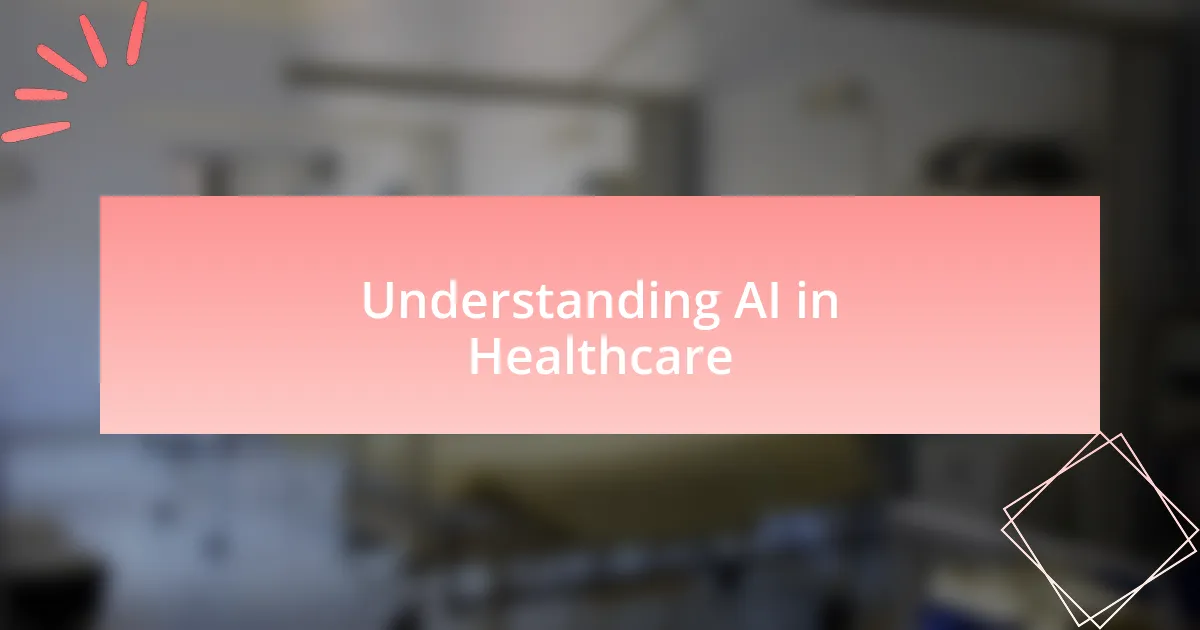
Understanding AI in Healthcare
AI in healthcare is not just a buzzword; it’s redefining how we approach patient care. I remember attending a workshop where a healthcare professional shared their experience of using AI for early disease detection. The sense of hope in that room was palpable. Can you imagine the impact of identifying a critical disease at its onset?
As AI systems analyze vast amounts of data, they can identify patterns that humans might miss. I recently came across a case where a machine-learning model flagged irregularities in patient data, prompting timely intervention. That’s when it hit me—this technology has the potential to save lives, transforming not only patient outcomes but also our understanding of health management.
I often wonder how this intelligent technology will continue to shape the future of healthcare. For instance, think about how personalized treatment plans generated by AI can enhance patient experience and outcomes. It’s exciting yet daunting, considering we are at the beginning of this journey, and the possibilities seem endless.
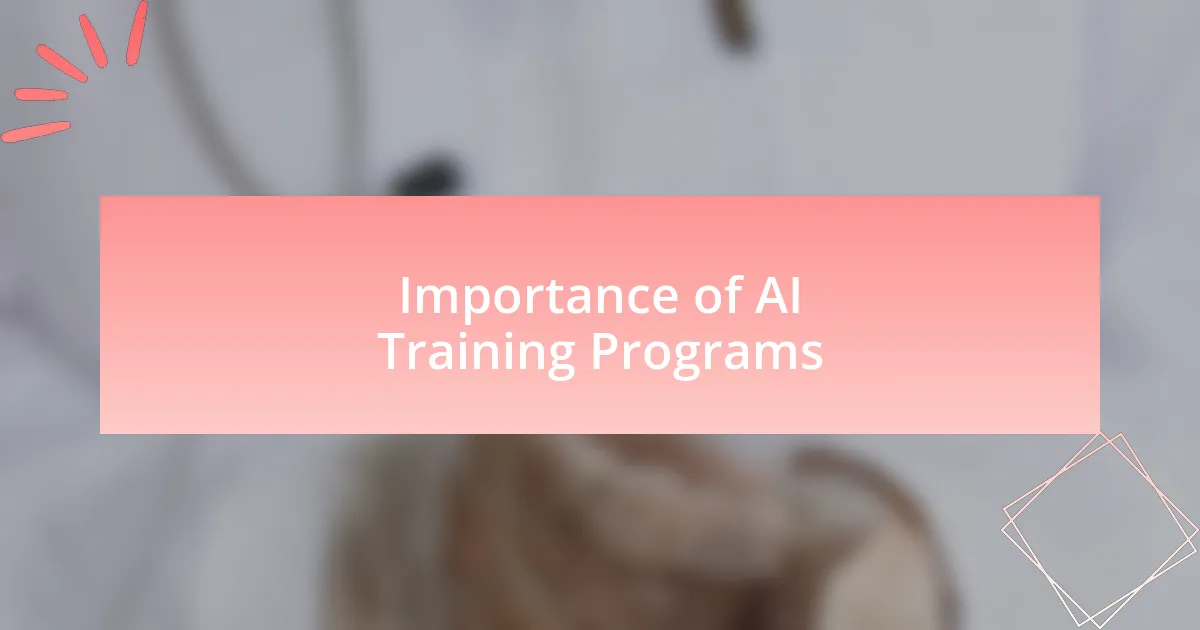
Importance of AI Training Programs
AI training programs play a crucial role in bridging the gap between technology and healthcare professionals. I remember my initial skepticism about using AI in medical decision-making, but after participating in a training program, I developed a newfound confidence in applying these tools effectively. It’s fascinating to witness how targeted training can turn uncertainty into expertise, enabling healthcare workers to leverage AI for improved patient outcomes.
The importance of these programs cannot be overstated; they provide essential skills that empower professionals to understand and utilize AI algorithms meaningfully. Recently, I spoke with a nurse who shared how a comprehensive AI training program transformed her understanding of data analytics in patient care. She explained that this knowledge not only improved her work efficiency but also fostered a deeper connection with her patients, as she could make more informed decisions based on accurate insights.
Ultimately, AI training programs ensure that healthcare workers are not just passive users of technology but active participants in the innovation process. This shift in mindset is invigorating. Think about the potential—how many more lives could be positively affected if professionals felt empowered to integrate AI into their daily practice? Investing in these training programs is not just a trend; it’s a necessary step toward a more effective and compassionate healthcare system.
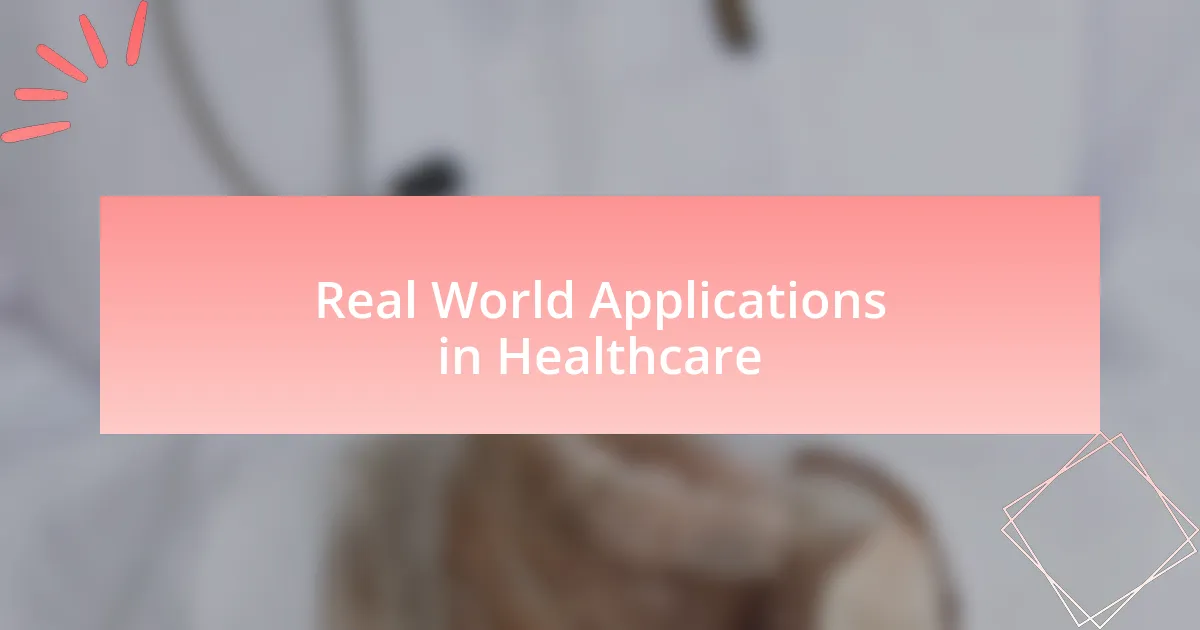
Real World Applications in Healthcare
One compelling real-world application of AI in healthcare is the use of predictive analytics for patient outcomes. I recall a discussion with a doctor who implemented an AI-driven tool to identify patients at risk of developing complications post-surgery. It was eye-opening to hear how this tool not only saved lives but also reduced hospital readmission rates, showcasing the transformative potential of harnessing data effectively.
In another instance, I came across a case in which an AI platform assisted in diagnosing rare diseases. A physician shared with me how the system analyzed patient symptoms and medical histories, presentations that had previously baffled medical staff. This experience not only accelerated the diagnostic process but also highlighted the importance of collaboration between technology and clinical expertise. Can you imagine the relief for both patients and doctors when a diagnosis that once took weeks can be achieved in hours?
Moreover, chatbots powered by AI are changing the landscape of patient engagement. I’ve seen firsthand how these virtual assistants provide patients with immediate answers to their healthcare questions, thus freeing up valuable time for healthcare providers. It’s fascinating to think about the potential for these tools to foster a more proactive approach to health management. What could that mean for patient satisfaction and chronic disease management? The possibilities are truly exciting.
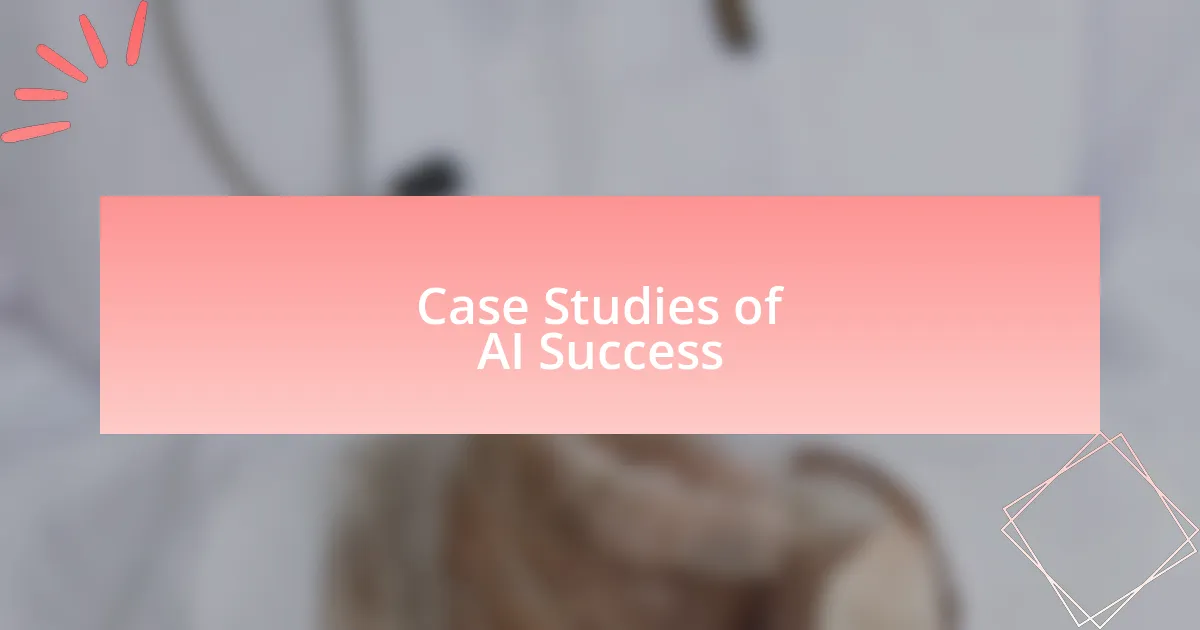
Case Studies of AI Success
One remarkable case study shows how AI is reshaping radiology. In my past conversations with radiologists, they shared remarkable results from an AI system that identifies anomalies in imaging scans. It astounded me to learn how this technology reduced the time taken for diagnoses and improved accuracy. When you think about how many lives depend on timely and precise diagnoses, it feels like we are standing on the brink of a revolution in patient care.
Another fascinating example I encountered involved AI in drug discovery. A pharmaceutical company utilized AI algorithms to analyze complex biological data, which significantly accelerated the identification of potential drug candidates. I couldn’t help but feel a sense of hope when I realized this could lead to new treatments in record time. Isn’t it exciting to consider how quickly we could tackle diseases that once seemed insurmountable?
Additionally, I’ve encountered a healthcare organization that implemented an AI tool for personalized treatment plans. Clinical staff noted an improvement not only in patient outcomes but also in overall staff satisfaction. I often wonder how much more empowered patients must feel when their treatment is tailored to their unique needs. This approach truly exemplifies how AI is enabling a shift towards a more patient-centered experience in healthcare.
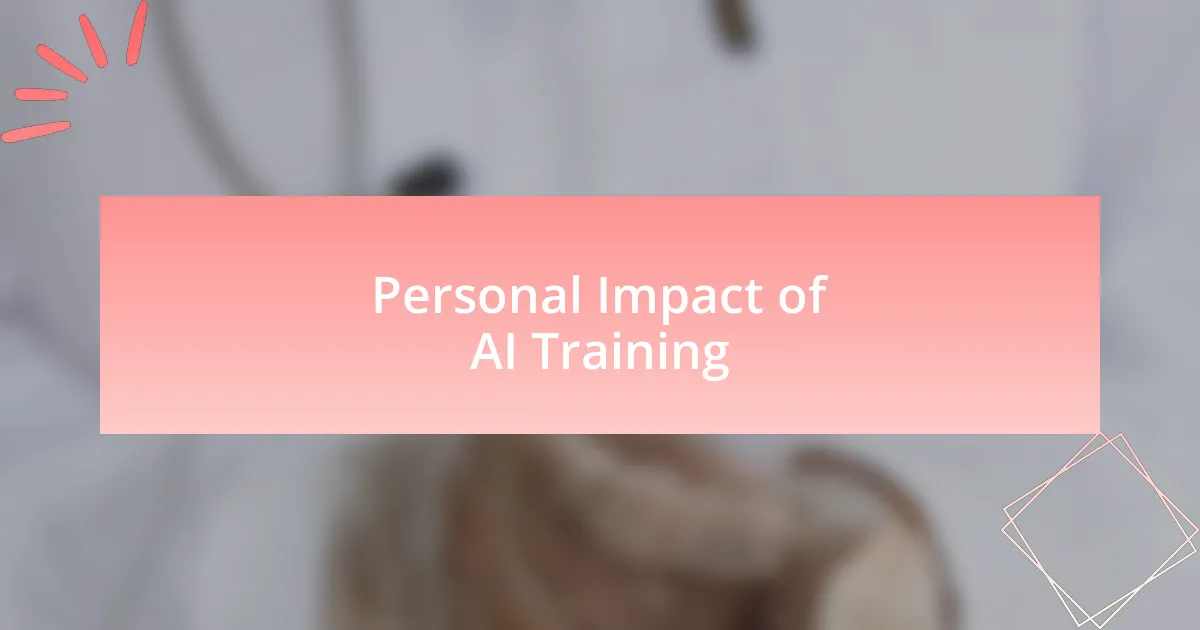
Personal Impact of AI Training
The personal impact of AI training on my perspective has been profound. I still remember the first time I delved into a machine learning model designed for predicting patient readmissions. It struck me how this technology not only equipped me with the skills to decipher complex data but also highlighted the real-world implications for clinicians and patients alike. Have you ever considered how a simple prediction could lead to interventions that save lives?
Attending AI training workshops has transformed my understanding of data application in healthcare. One memorable session involved a hands-on project that allowed us to use AI to analyze patient feedback, revealing nuanced insights into their experiences. This experience opened my eyes to the power of data in shaping better healthcare practices. It made me realize that every statistic has a story behind it, and we, as healthcare innovators, have a responsibility to listen.
Moreover, the collaborative atmosphere fostered in these programs inspired a new level of enthusiasm in my work. Engaging with professionals from diverse backgrounds illuminated ideas I had never considered before. Sharing our insights and challenges created a supportive network that I still lean on today. Isn’t it fascinating to think about how collective learning drives innovation in our field? The camaraderie was not just educational; it undeniably bridged gaps between traditional practices and future possibilities.
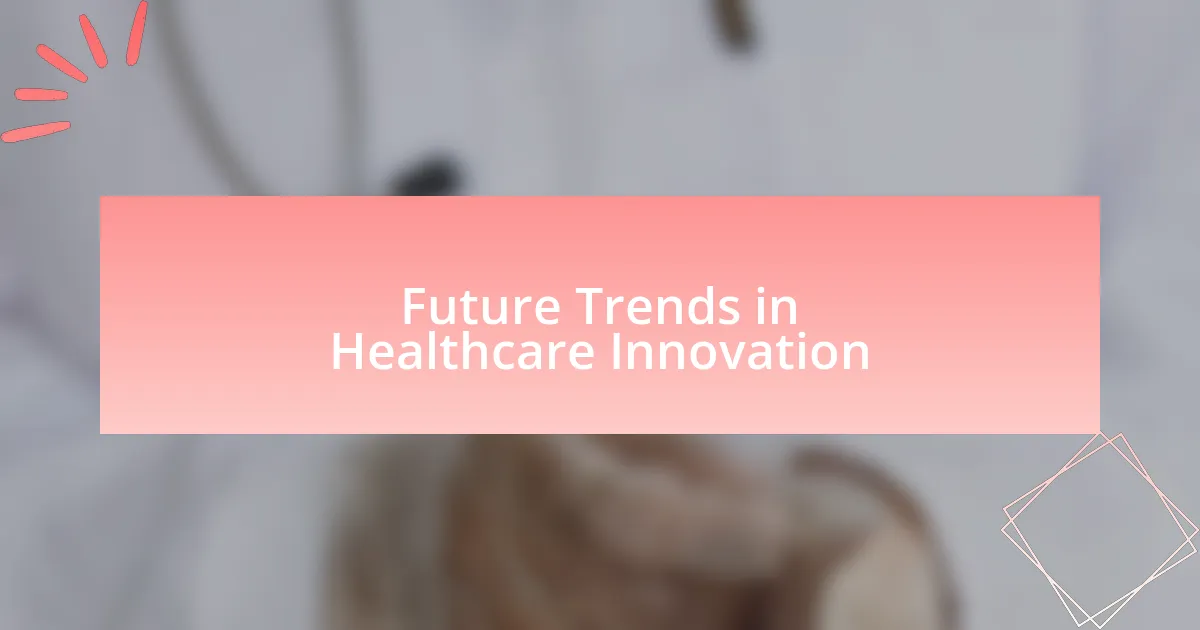
Future Trends in Healthcare Innovation
Future trends in healthcare innovation are poised to redefine patient care through the integration of AI and telemedicine. I recently witnessed this firsthand while attending a presentation on virtual health consultations, where an innovative platform showcased real-time monitoring of patients’ vital signs. Can you picture a future where doctors can diagnose conditions before symptoms even manifest, all from the comfort of a patient’s home? It’s groundbreaking!
Another intriguing development is the rise of personalized medicine, driven by AI algorithms that analyze genetic information to tailor treatments. I recall a case discussed in one of my workshops about how AI identified the most effective therapy for a cancer patient based on their unique genetic makeup. This not only improved the chances of recovery but also minimized side effects. How inspiring is it to think that technology can take healthcare from a one-size-fits-all approach to something incredibly personal?
Furthermore, the push towards integrating AI in administrative tasks is shifting the focus back to patient care. I remember brainstorming in a group about automating scheduling and billing processes, allowing healthcare professionals to spend more quality time with patients. Doesn’t it make you hopeful that we might soon see a healthcare environment where technology enhances human connection rather than replaces it? The future truly holds exciting possibilities!